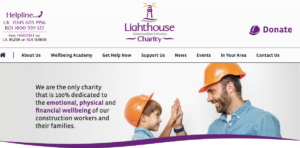The Lighthouse Construction Charity has launched a new ‘hard-hitting’ video (which can be watched below) to help spread awareness around helping fellow workers that might be struggling in some way as a result of the implications of a tough year for the industry.
Its mission is that no construction worker or their family should be alone in a crisis. The video says: “Right now, our human spirit is being tested,” so if you see someone struggling, don’t stand on the side-lines.” It asks for people to follow three simple steps: ask twice-as you may get a different answer, listen non-judgementally and be kind. Spontaneous acts of kindness can really help, says the video.
According to the Lighthouse Charity’s 2019 Impact Report, there was a 57% increase in case presented to the Construction Industry Helpline in 2019 compared to the previous year at 2,615 cases. Over the same period, there was also a 110% rise in the amount of families receiving advice on welfare and mental wellbeing. From these figures, 47% of the cases were related to financial support, 30% related to mental health support and the rest made up of general advice, legal support, debt advice, tax advice and education and training.
Around 77% of those seeking help were mem, while 62% of the charity’s emergency financial grants were related to helping pay for daily living costs including buying food, paying utility bills and clearing rent arrears and debt.
The construction Industry’s Building Mental Health Framework that Lighthouse manages, is a vital component of the broader Safer Highways’ Road to Wellbeing Programme. The two organisations have a long-standing commitment to work together to improve standards on mental health across the whole of the highways and construction industry.
According to the charity, every working day, two construction workers take their own life. “We have to educate everyone in our industry to recognise the signs and symptoms of our colleagues that are suffering from stress, anxiety or depression and start the conversation to assist in their recovery.”





















